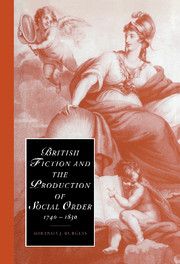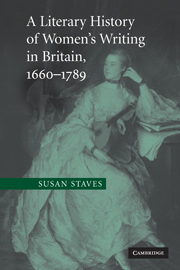British Fiction and the Production of Social Order, 1740–1830
In British Fiction and the Production of Social Order Miranda Burgess examines what Romantic-period writers called 'romance': a hybrid genre defined by a shared role in the negotiation of conflicts between political economy and moral philosophy. Reading a broad range of fictional and non-fictional works published between 1740 and 1830, Burgess places authors such as Richardson, Scott, Austen and Wollstonecraft in a new economic, social and cultural context. She explores the interaction between writing and the formation of community, particularly in relation to issues of legitimacy and gender. Burgess argues that the romance held a key role in remaking the national order of a Britain dependent on ideologies of human nature for justification of its social, economic and political systems.
- Offers a new definition of the genre romance
- A broad range of fictions, canonical and non-canonical, is treated
- Reads political history through the history of letters without collapsing the two
Reviews & endorsements
"A book that offers much insight into eighteenth-century culture, with the added benefit of charting an engaging literary history that connects Romanticism with the literature of sensibility." Wordsworth Circle
"[It] does provide a substantive and valuable expansion to our understanding of the ways in which romance variously intersected with shifting contemporary political discourses." Nineteenth-Century Literature
Product details
November 2000Hardback
9780521773294
324 pages
229 × 152 × 22 mm
0.65kg
1 b/w illus.
Available
Table of Contents
- List of figures
- Acknowledgments
- Introduction: romantic economies
- 1. Marketing agreement: Richardson's romance of consensus
- 2. 'Summoned into the machine': Burney's genres, Sheridan's sentiment, and conservative critique
- 3. Wollstonecraft and the revolution of economic history
- 4. Romance at home: Austen, Radcliffe, and the circulation of Britishness
- 5. Scott, Hazlitt and the ends of legitimacy
- Epilogue: Sensibility, genre and the cultural marketplace
- Notes.






